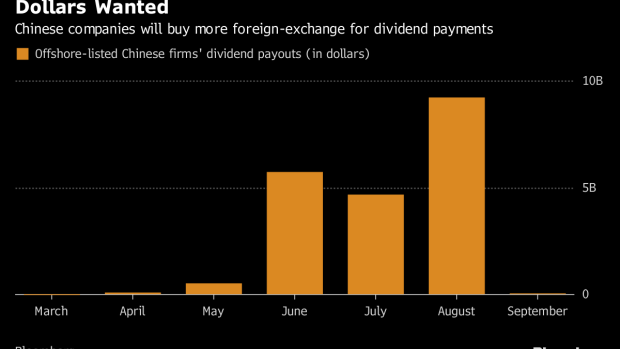Jun 14, 2018
China's Yuan Set to Get Hit With $20 Billion Dividend Onslaught
, Bloomberg News

(Bloomberg) -- China’s currency has had a bumpier ride the past several weeks than it’s seen since it stabilized against the dollar in 2017, and further turbulence may be in store as companies prepare to make a welter of dividend payments abroad.
Offshore-listed Chinese firms will hand out $19.6 billion of dividends in overseas currencies in the three months through August, according to data compiled by Bloomberg. While some of the payments will be made from existing foreign-exchange holdings, some conversions from yuan will be needed, contributing to volatility, market players say.
After a long stretch of gains from 2017 to early 2018, the yuan lately has been confronting a resurgent dollar, thanks to rising U.S. Treasury yields. China’s currency dropped the most since 2016 last month, when its foreign-exchange reserves saw the first back-to-back drop in more than a year. On the flip side, depreciation has been limited by overseas investors’ increasing interest in Chinese securities, with net bond inflows the past 15 straight months.
"The yuan will likely weaken and become more volatile within a short period of time in the coming months due to the dividend payments," said Gao Qi, a currency strategist at Scotiabank in Singapore. "That won’t lead to sustained depreciation or capital outflows -- the yuan will be supported as foreign investors keep adding Chinese bonds."
Chinese companies’ dividend payments over the three months through August will be 23 percent greater than the same period last year, according to Bloomberg’s calculations based on exchange filings. Hong Kong-listed Chinese lenders are among the biggest payers. China Construction Bank Corp. will hand out $4.2 billion in August, when Bank of China Ltd. pays $2.1 billion, the filings show.
Analysts expect the yuan, which is still up 1.8 percent for 2018 -- the top performer after the yen in Asia against the dollar -- to ride out the volatility. Come year-end, the yuan will trade at 6.4 per dollar, compared with 6.3911 on Thursday, a Bloomberg survey shows.
"There will be a quick bout of depreciation pressures" due to the dividend payouts, said Xiao Lisheng, a Beijing-based researcher at the Chinese Academy of Social Sciences. "As soon as the round of declines are out of the way, companies will start to buy the yuan again, supporting the exchange rate."
To contact Bloomberg News staff for this story: Tian Chen in Hong Kong at tchen259@bloomberg.net;Ran Li in Beijing at rli279@bloomberg.net
To contact the editors responsible for this story: Richard Frost at rfrost4@bloomberg.net, Ron Harui, Christopher Anstey
©2018 Bloomberg L.P.